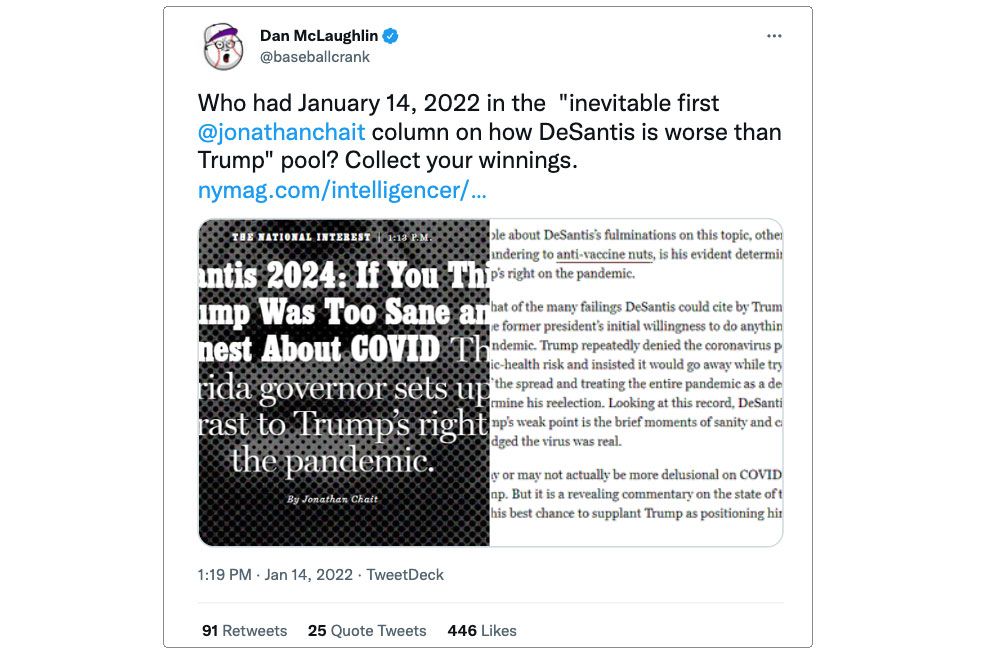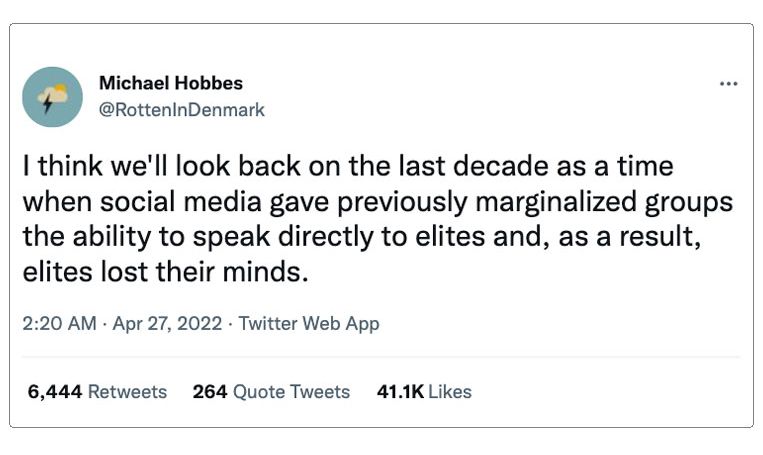| There is a certain strand of conservative who loathes Donald Trump and even considers him a menace to democracy — but also believes the problem is entirely one of personality and temperament. Trump is personally unfit for the role, and, to the extent that other Republicans who support him are implicated, it is evidence that they are personally gutless and weak. |
| I have been making an alternate case since 2016. Yes, Trump is an outlier in his admiration for dictators and willingness to lie and cheat. But he reflects a broader ideological evolution within his party. The history of the conservative movement is replete with forthright arguments against democracy — which the American right has always seen as a threat, because it enables the majority to threaten the property of the wealthy minority through regulation and redistribution. |
| This theory explains, among other things, why so many Republicans have ultimately chosen to support Trump over his Democratic opponents. They are not all cowards. Rather, they think, whatever his shortcomings, Trump poses a less severe threat to freedom and liberty, because he endorses lax regulation and low taxes on the rich. |
| The conservatives who treat Trump’s unfitness as entirely personal obviously don’t agree with this analysis. In general, I’ve found that they don’t take it seriously. They have a mental model that begins and ends with the idea that the problem is one of temperament. To the extent that they have come into contact with any broader critique of right-wing authoritarianism, they dismiss it as obvious bad faith. How can we take liberal complaints about Trump seriously, they wonder, if they make similar complaints about other Republicans? |
| This was the response some of the National Review crowd has given to my critique of Ron DeSantis’s extremism — the mere fact that I would make this charge at all against a non-Trump Republican exposed my complaints about Trump. |
 | ![]() | | Photo: @baseballcrank/Twitter | | | | Notice how any evidence of ideological contagion that implicates the broader party is simply treated as a self-refuting allegation. |
| Daily Beast columnist Matt Lewis is a classic archetype — an anti-Trump conservative whose critique of Trump runs one inch deep. Lewis has encountered my argument about DeSantis as a competent Trumpist and, in particular, his critique of democracy. It has left him flabbergasted and angry: |
| According to Chait, American conservatives have always believed that the New Deal was unconstitutional and that redistribution is the biggest threat to liberty. And because redistribution can be enacted via the democratic process, Chait surmises that conservatives don’t like democracy. |
| The most revealing thing about this response is that Lewis writes that I surmise DeSantis distrusts democracy because it enables redistribution. Surmising was unnecessary. DeSantis writes this himself plainly in his book many, many times. The apocryphal founders’ quote, “When the people find they can vote themselves money, that will herald the end of the republic,” is the thesis of DeSantis’s book. |
| Of course, Lewis has a right to question my interpretation of the book. But there’s no evidence in his column that he has read the book or even my article — which is not one of the many links he includes. Lewis writes that he heard my argument on a podcast, and that seems to be the extent of his research on the question. |
| He goes on to complain that my argument about DeSantis, or the parts of it he was able to pick up from the podcast, “feels like a bait-and-switch.” The media should have been “serious, judicious, honest, fair” but instead: “They tried to run up the score. They took cheap shots.” |
| I try to be serious, judicious, and so on, but I don’t know what kinds of arguments can persuade people who don’t read arguments. Large segments of the conservative intelligentsia that resisted Trump are going to return to the fold when he departs the scene, because they consider any questioning of the regular conservative movement’s commitment to democracy to be unfair on its face. |
| There was a small crack in the façade after DeSantis openly punished Disney in retribution for its opposition to his anti-gay law. A handful of conservatives expressed their dismay — with NR’s Phil Klein calling the maneuver “Gangster Government.” |
| However, on the whole, DeSantis paid little for his thuggery. On the contrary, he was rewarded for it by the mainstream media with a host of stories pondering the populism of it all. The New York Times ran a story headlined “Punishing Disney, DeSantis Signals a Lasting G.O.P. Brawl With Business.” The Washington Post’s analysis was headlined “GOP’s cozy ties with big business unravel as DeSantis unloads on Disney.” |
| But DeSantis is not signaling hostility to corporations. He is not challenging the party’s approach to regulation, taxes, or labor. He is simply showing he is willing to exempt corporations that step out of line politically from the general regime of favorable treatment. |
| A good way to explain the difference is to examine this method in extremis. Vladimir Putin is very cozy with big business in Russia. But Putin has taken some extremely harsh stances toward large firms and their owners. He has seized their assets and thrown them in prison. Is this “populist”? No, it’s simply authoritarian. |
| Obviously, DeSantis has not gone anywhere close to as far as Putin. What he has demonstrated, however, is proof of concept of the method. He can intimidate firms that defy him politically. His party will support him. And the news media will even treat him like a populist for it. What reason is there to think he won’t do much more of this as president? |
| In a widely shared post, the left-wing writer Michael Hobbes expressed a popular progressive stance on the value of Twitter as a forum that has elevated the voices of “previously marginalized groups.” |
 | ![]() | | Photo: @RottenInDenmark/Twitter | | | | If we follow the most intuitive understanding of the term “marginalized groups,” this is the complete opposite of reality. The New York Times studied this dynamic and found that Twitter magnifies the voices of disproportionately white college-educated liberals. It marginalizes the views of Black and non-college-educated voters. |
| This all became glaringly evident during the 2020 presidential primaries, when almost nobody on Twitter supported Joe Biden — until it turned out the Democratic Party electorate looked very different. That same dynamic has repeated itself in numerous elections that have exposed the vast gulf between the white college-educated simulacrum of the Democratic electorate on Twitter and the brick-and-mortar version. |
| Yes, Twitter has been terrific for me. I enjoy the site as a way to make lots of jokes, find stories that might otherwise not come to my attention, and promote my work. If Twitter had never been invented, my career would probably be in worse shape. Of course, I’ve never been marginalized. |
| Now, it is true that Twitter has elevated the views of politically marginalized groups — specifically, people with very left-wing views. And those groups have gained dramatically greater levels of influence over the media, culture, and politics as a result. That is a change that has had some positive and some negative results. |
| But let’s be honest: What it actually means in practice is that it has made the Democratic Party, the news media, and culture more responsive and accountable to the views of white college-educated progressives like Michael Hobbes. And it has grown less responsive and accountable to the views of Americans who are working class and people of color. |
| John E. McDonough spoke with a long list of right-wing activists and policy influencers to try to figure out what Republicans want to do about health care now that their effort to repeal Obamacare has failed. In the main, he finds, writing for Politico, that they have no stomach left to try another full-scale repeal and will instead chip away at the coverage protections by carving out cheaper plans for healthier individuals. |
| Here’s one sentence that stood out to me. McDonough was inquiring as to whether Republicans would finally consider opening up the entire country to Medicaid expansion. The answer was simple: “No conservative experts with whom I spoke would openly disagree with the holdout states.” |
| Republicans, of course, deemed Obamacare a socialist monstrosity that was bound to collapse. As part of their efforts to sabotage and destroy the law, they organized to pressure Republican states to refuse to take funds from the federal government supplied by the law to expand Medicaid coverage to low-income citizens in their states. Several states have since quietly joined, but 12 holdouts remain including Florida, Georgia, and Texas. |
| Obviously, this refusal is extremely harmful to low-income people in those states — millions of whom cannot get health care as a result. But it is also harmful to others. Hospitals have to pay more, because when uninsured people end up in the emergency room, the hospitals are not allowed to deny them coverage but have no way to collect the cost. (The patients, of course, are worse off relying on emergency rooms than if they had access to regular care.) Employers are likewise worse off, because their workers are not being subsidized with insurance that could keep them healthy. Republicans are generally sympathetic to hospitals and employers — it’s just that their desire to help them is outweighed by their desire to hurt low-income people who lack insurance. |
| Conservatives used to try to make the counterintuitive argument that going uninsured was somehow better for people than being on Medicaid — relying for this case on one underpowered study that has since been contradicted by multiple other sources of data. There is a huge amount of research now that shows Medicaid expansion has a broad swath of completely intuitive benefits for states that take it. Their citizens are healthier and have more financial security and economic mobility. |
| Public opinion certainly isn’t holding back Republicans. When advocates have managed to get it on a ballot, Medicaid expansion has passed — even in deep-red states. It’s extremely popular. |
| Opposition to Medicaid expansion is a test of commitment to the conservative movement’s anti-government creed. It is as good an indicator as can be found of the GOP’s unique extremism on the role of the state — it is the only major right-of-center party in any democracy across the globe that refuses to acknowledge that access to health care should be universal for all citizens. |
| The party’s method to holding the line on further Medicaid expansion is avoiding the question and keeping it out of the public debate. That is why McDonough’s answer — they would not “openly disagree” with the holdout states — is so revealing. The party’s cadre of health-care policy may understand that there is no viable alternative policy path to providing minimal access to basic health care to low-income people in the holdout states — which are inflicting cruelty on their most vulnerable citizens. But conservative-movement discipline requires them to not speak out against it. If they said something publicly, they would lose their influence within the party. |
| The center left has directed a lot of justified criticism at the left for what Matt Yglesias calls “coalition brain” — a mentality that prioritizes maintaining peace in your party’s coalition at all costs and, therefore, suppresses the channels for exposing error. The key thing to grasp is that this mentality took over the Republican Party so long ago that none of its members can even imagine a world that operates differently. |
| Stay informed about business, politics, technology, and where they intersect. Subscribe now for unlimited access to Intelligencer and everything New York. |
| If you enjoyed reading &c. by Jonathan Chait, forward it to a friend. For more from Intelligencer, sign up for the daily newsletter or One Great Story to get a single editor-selected longread sent to you every weeknight. |
| | |




